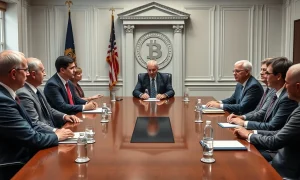Former President Donald Trump’s recent attacks on Federal Reserve independence have triggered alarm among economists and investors worldwide. Consequently, many experts now warn that the United States may face unprecedented emerging market-style risks that could destabilize both Treasury markets and the dollar’s global standing.
Understanding Emerging Market-Style Risks
Emerging market-style risks typically describe vulnerabilities seen in developing economies. These risks include currency volatility, capital flight, and loss of investor confidence. However, the United States has historically avoided such challenges. Now, political pressure on monetary policy creates concerning parallels.
Federal Reserve Independence Under Threat
The Federal Reserve maintains crucial independence from political influence. This separation ensures monetary decisions prioritize economic stability over political agendas. Trump’s criticism challenges this fundamental principle. Therefore, investors worry about potential policy shifts.
Key concerns include:
- Politicized interest rate decisions
- Erosion of institutional credibility
- Reduced foreign investment in Treasurys
- Currency depreciation pressures
Treasury Market Vulnerability
US Treasury bonds represent the world’s safest assets. Foreign governments and investors hold trillions in Treasury securities. Emerging market-style risks could undermine this confidence. Subsequently, borrowing costs might increase dramatically.
Dollar Dominance at Risk
The US dollar serves as the global reserve currency. This status provides significant economic advantages. Political interference with the Fed threatens dollar stability. Other nations might seek alternative reserve currencies.
Historical Precedents and Comparisons
Several emerging markets experienced similar scenarios. Political leaders pressured central banks for short-term gains. These countries faced severe economic consequences. The United States could follow this dangerous path.
Market Reactions and Investor Sentiment
Financial markets already show signs of concern. Bond yields have become more volatile. Currency markets reflect growing uncertainty. Investors monitor Fed communications closely for any political influence迹象.
Long-Term Implications for US Economy
Sustained political pressure on the Fed creates lasting damage. The United States might lose its safe-haven status. Higher borrowing costs could reduce economic growth. Furthermore, inflation might become harder to control.
Protecting Against Emerging Market-Style Risks
Maintaining Fed independence remains crucial. Congress designed the central bank to operate without political interference. Preserving this structure protects against emerging market-style risks. Investors and policymakers must defend this principle.
FAQs
What are emerging market-style risks?
These refer to economic vulnerabilities typically seen in developing nations, including currency instability, capital flight, and loss of investor confidence.
Why is Fed independence important?
Independent central banks make monetary decisions based on economic data rather than political pressures, ensuring long-term stability.
How could Trump’s comments affect Treasury markets?
Political interference concerns might reduce foreign investment in US debt, potentially raising borrowing costs and increasing volatility.
What protects the US from these risks currently?
Strong institutions, the dollar’s reserve currency status, and deep capital markets provide protection, but these aren’t invulnerable.
Have other countries experienced similar issues?
Yes, several emerging markets faced economic crises after politicians undermined central bank independence for short-term gains.
Can the US dollar lose its reserve status?
While unlikely immediately, sustained political interference with monetary policy could accelerate moves toward alternative reserve currencies.








